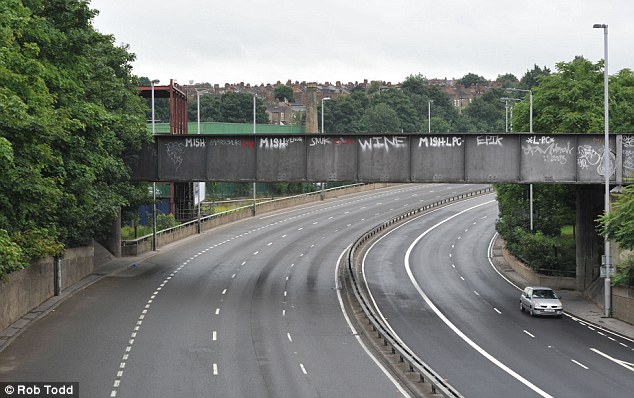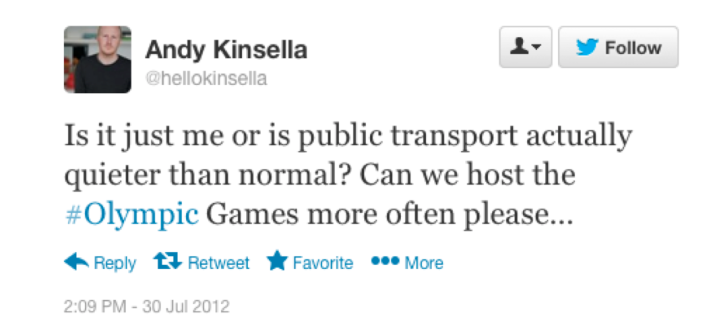
Organizers of major sporting events, from this weekend's "Mass Transit Super Bowl" to the Sochi Olympics a week from now, may benefit from a lesson learned during the 2012 London Olympics: a tactic transportation planners secretly call “the Big Scare.”
They don’t like to talk about it in public. But Graham Currie, a professor of public transport at Australia’s Monash University and a consultant to London’s Olympic transportation designers in 2012, divulged this secret at the Transportation Research Board earlier this month. In a panel on reducing vehicle miles driven through transportation demand management, Currie acknowledged that the Big Scare is “extremely unpalatable to talk about publicly, but it’s extremely powerful.”
In London, the presence of 14,000 athletes, 21,000 members of the media, and 800,000 spectators for the 2012 summer Olympic games was expected to increase daily travel by about 20 million trips, or about 30 percent over a normal day. And a normal day in London is already pretty congested.
“This is really the best example in all of world history of demand management,” Currie said. “And that works through what we call ‘lowering service quality expectations.’”
So planners employed the biggest Olympic lane network in history to restrict road use. They adjusted traffic signals and boosted transit capacity, even ticketing Olympic events jointly with the rail system.
But the real key to their success was the Big Scare. Without it, they wouldn’t have had the cooperation of Londoners to reduce their impact on the transportation network. And that step is essential. “You cannot do it without less travel by local residents,” Currie said.
Olympic transportation planners reached out to tens of thousands of employers, encouraging them to get their workers to “reduce their overall need to travel, or re-time, re-route or revise their mode of travel.” Their key message was “public transport is king -- you’re not going to drive there.” When possible, employers were asked to allow workers to work from home.
The media was only too happy to contribute to the Big Scare by publishing sensationalized stories of the transportation “chaos” expected to ensue. And indeed, there was a lot of confusion in the days leading up to the Olympics, as well as protests by taxi drivers. All of that was happening in the days before the games, when the international media was there with nothing else to cover.
Planners made information available on when and where the expected hotspots were, timed with the various events, utilizing models that could forecast how congested the Tube would be. (They also made sure to time major events on weekends as much as possible, when baseload demand is lower.) They installed jumbotrons around London where people could watch events live, which dispersed travel.
In the end, the hotspots weren’t hotspots. During the games, the transportation network worked well and congestion levels actually dropped. Some “complained” about getting to work too early. Transit riders were tweeting things like this:
Regular summer tourism was reduced, due to fears of transportation chaos. Merchants were furious that business was slower than usual, with Londoners staying home and tourists staying away.
“The Big Scare has a great effect in reducing baseload demand,” Currie said. “It’s about managing expectations. It’s enshrined in a phrase developed just after Atlanta: 'under-promising and over-delivering.'”
Maybe Olympic planners had taken notes during LA’s Big Scare experiment: the 2011 “Carmageddon” episode, when the 405 freeway was temporarily closed for construction. When traffic ended up not being so bad, some people thought the hype had been overdone -- but if it weren’t for the hype, the roads likely would have been gridlocked. People just internalized the scare tactics, took warnings seriously, and adapted their plans.
In London, 35 percent of regular travelers changed their routine during the games. Road travel was reduced somewhere in the 10- to 30-percent range. Traffic disruption fell 20 percent. Ridership on the Tube increased 35 percent, bus ridership rose 100 percent -- and transit still felt quiet. Olympic “family” members -- people authorized to use the Olympic lanes -- experienced trip times 30 percent faster than a normal day.
“This is the most amazing story in transport history,” Currie said. “We should be doing it every day. But we do the exact opposite. We get political people standing up there telling us how perfect everything’s going to be. It’s time we actually were honest and said that congestion is getting worse. It’s going to get worse. It’s time to start changing our expectations and changing our travel habits.”






